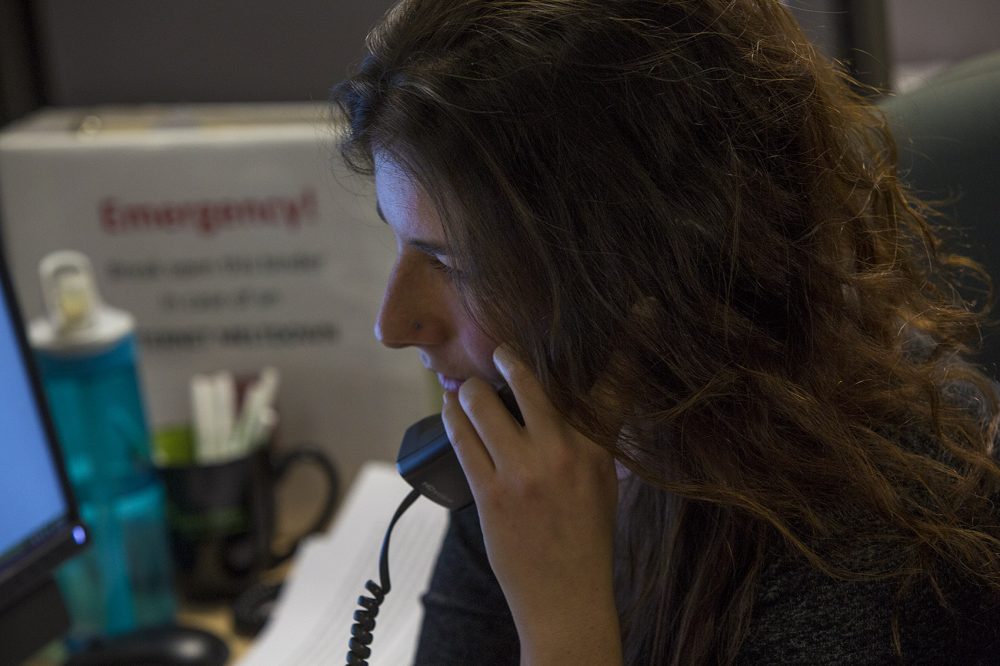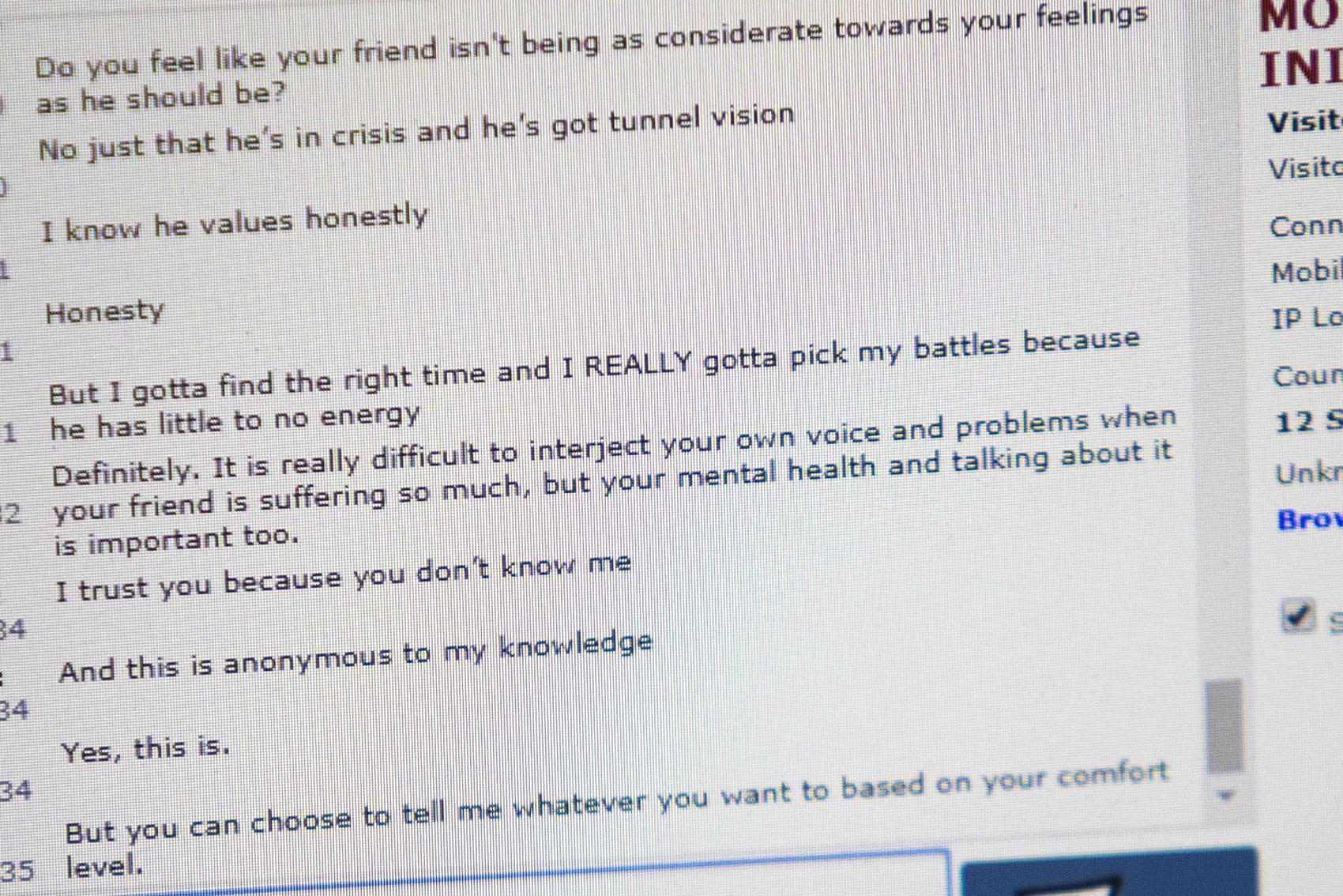Advertisement
Coronavirus Coverage
Crisis Hotlines In Mass. See Rise In Calls, Texts During Pandemic

Some suicide prevention hotlines in Massachusetts have seen a significant increase in calls in the first six months of 2020, with the most notable jump happening since the pandemic began in March.
Samaritans in Boston reports an 84.1% increase in text messages to its crisis line during the period of March 12 to June 30 this year, compared to the same time last year. Phone calls to the hotline went up 23.5% — from 28,768 to 35,535.
"The people who call us tend to have fragile support systems to begin with," says Ron White, Samaritans' chief program officer. "Those support systems pretty quickly fell apart in terms of being able to be around other people, whether that's in community groups or a church or any kind of community setting. So we're hearing that people who are lonely are even lonelier now. We're hearing that people are worried about, 'If I become sick, who would take care of me?'"

In the earlier days of the pandemic, White says, the difficulty of finding basic supplies triggered people dealing with mental health issues.
"There was a caller who was very upset because she knew that she needed to physically isolate, yet she was driving from store to store to try to find toilet paper," White recounts. "And for her, that was pretty anxiety producing."
In March and April, 20% to 30% of people who reached the hotline mentioned concerns related to COVID-19. In May and June, those numbers dropped to 15% and 12% respectively, White says.
In Framingham, United Way of Tri-County says calls answered by its Call2Talk crisis line for the period of March through June were up 21.3% over the same period in 2019.
The two biggest reasons people call a helpline are "a feeling of loss and a feeling of the unknown — what's unexpected, what's yet to come — which promotes angst and anxiety," says Eileen Davis, director of Call2Talk. "And the pandemic, the coronavirus, has done both. People are experiencing loss of jobs, loss of life as the way it was ... loss of finances, loss of life."
Davis says call volume increases every year.
"But ... the demand for the service has exponentially increased. And I do think that is indeed because of the pandemic," she adds. "What I've been anticipating for the coming months, if not the next few years, is that the next pandemic will be the mental health pandemic. I think the demand is going to go up even more."
The percentage of calls to Call2Talk in which concerns related to the coronavirus were mentioned averaged 41% for the months of March (beginning March 12), April, May and June, according to Davis.
Samaritans of Fall River/New Bedford has seen a different trend. It reports a slight drop in calls answered by its hotline — 2,990 between March 12 and June 30 this year, compared to 3,311 in 2019. However, it saw a striking increase in the percentage of callers reporting feeling suicidal in May and June of this year (16%), compared to May and June of last year (7% and 9% respectively).
Samaritans in Boston says the level of suicidal risk with which its callers and texters have presented has remained flat; but the number of first-time callers shot up in May, when there were about 1500 people who reached out to the crisis line for the first time. The first four months of the year averaged 960 first-time callers.
In the last month-plus, more than 200 people — or 2% of people who called or texted — have discussed anxiety or other concerns related to the killing of George Floyd by police in Minneapolis, racism and police brutality.
Samaritans Executive Director and President Kathy Marchi says volunteers are trained to respond to whatever concerns callers raise.
"The befriending is what works, and that's really what our volunteers are using, whether it's about the pandemic ... or the social justice issue," Marchi says. "That's validating and acknowledging what people are feeling, and listening to them."
However, she and White add, Samaritans needs to provide training and take other steps specific to racism and diversification.
"What we need to do, not just with our volunteers, but with our entire team, as well, is take a harder look at this issue of racism and institutional racism, and ... [ask], 'How are we a part of that? How can we not participate in that?'" White reflects. "What are the microaggressions that people face on a daily basis? There's plenty of opportunity to expand and explore with that."
The organization's approximately 200 volunteer call and text takers have been working remotely since March 16, with technology to answer the crisis line's calls and texts from home. That presents a new challenge in that the volunteers don't have support from peers and supervisors in person, Marchi and White say. Also, they can't as easily separate the call taking, which can be stressful, from their personal lives.
Samaritans encourages its volunteers to talk with their team leaders when they check out of their shift about how they're feeling, what they heard or read on the calls or texts they took during that shift, and what steps they're going to take to detach and practice self-care.
Both Samaritans in Boston and Call2Talk have seen a trend they call encouraging: more people signing up to volunteer as call takers. But the whole training process has changed — with classes happening online, as opposed to in a room with trainees doing role playing and listening to speakers.
Those two organizations and the Fall River/New Bedford Samaritans operate the three call centers in Massachusetts that receive calls both from their own hotlines and the National Suicide Prevention Lifeline. Efforts are under way in Congress and the FCC to change the number for the national lifeline to an easy-to-remember three-digit number, 988.
Resources: You can reach the National Suicide Prevention Lifeline at 1-800-273-TALK (8255) and the Samaritans Statewide Hotline (call or text) at 1-877-870-HOPE (4673). Call2Talk can be accessed by calling Massachusetts 211 or 508-532-2255 (or text c2t to 741741).
